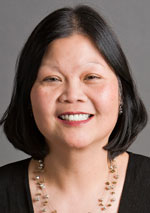With International Women’s Day upon us, I turn my thoughts to the important conversation about the role of women in the church. Since Pope Francis has talked about including the perspective of women in decision-making, this discussion has taken on more significance.
While Pope Francis has said that the issue of ordination of women in the Catholic Church is “closed,” he noted that the engagement of women needs to go beyond “altar girls or the president of a charity; there must be more.”
As a woman president of a charity, I have been pondering this comment. Putting aside the ordination of women, what is the “more” that Pope Francis suggests? Is it a move beyond women’s leadership of pastoral and social ministries to the consideration of where and how women can appropriately share in the governance of the church?
Is it an acknowledgement that for all the “doing” that women undertake to evangelize as parents and neighbors, serve as volunteers to sustain the vitality of the church, or work in and lead Catholic organizations, it is time for women to have a “place at the table” where the church does her thinking, teaching and policy-making?
[hotblock]
As a woman who made a career in a traditional male sector (business school deanship), I have seen progress made in professional enclaves of Western countries. Most people have moved beyond the question of whether women are as competent as men.
Society has spoken to the inherent prejudice and injustice when access to roles of authority and influence is denied. Actions to ensure equality include mandatory inclusion of women candidates in searches, established pools of qualified women, metrics to monitor progress, as well as efforts to move women into pipelines for development and onto platforms that offer visibility.
These efforts that pivot on opportunities, rights and remediation, important as they are, lack an integral dimension that must undergird the conversation about women in the church.
As the church is the body of Christ, a family, a community, the foundation of the conversation is first and foremost about relationship. How do the leaders of the institutional church wish to engage women as cherished members of the family? Loved like sisters, daughters, mothers and friends? Welcomed as colleagues? Sought out for their gifts? Invited as partners for the mission?
My parents had a traditional Chinese marriage: My father delegated to my mother the duties for running a household and raising six children. He never took her advice on investments (even though that advice turned out to be quite good), nor solicited her thoughts when he held court on global affairs, even though she read the newspapers daily.
He shared the stress of his problems, but not the problem-solving part. I knew that was not enough for my flourishing nor for a joyful and lasting marriage. I wanted to be a partner, not a subcontractor.
Catholic Relief Services runs the “Faithful House” program in Africa for couples. It centers on communication: learning to listen and talk to each other. From the ensuing attention, understanding and engagement, the couples come to cherish each other, open up to each other on important issues of children and finances, take better care of each other, share dreams and fears, and turn to the other as partners with hope for a future and a sense of common purpose.
Is this what the Pope Francis meant by “more”? Could collaboration, mutuality and shared responsibility happen more in the church? Could women contribute more to the governance of the church and the realization of the church’s mission?
***
Woo is president and CEO of Catholic Relief Services.
PREVIOUS: Truth under fire: What is a lie, and what is a mistake?
NEXT: When special-needs child arrives, it’s all hands on deck



I agree that the first step should be building communication between men and women such as exists in the CRS Faithful House program for couples. It might take a miracle and I believe at least some priests and hierarchy might be open to such a miracle.
Once communication is established it would be easier to talk about the rest of what’s needed.
One of my major problems with the institutional Church is that while it now preaches the equality of men and women, it still does not practice it. How many women are in positions of authority in the Vatican curia? Two, both what in a corporate hierarchy would be termed “middle management”.
The institutional Church has called itself “the most just of all societies”, but fails to come up to its own standard.
Based on the Catechism of the Catholic Church and John Paul II’s Theology of the Body, my understanding is that the ordination of women to the priesthood would be in perfect continuity with apostolic tradition:
Ordination of Women in the Sacramental Churches
http://www.pelicanweb.org/solisustv11n03supp6.html#section9
This is not about what women (or men) want. This is about discerning what Christ wants for the Church in the 21st century, for the glory of God and the good of souls. Would Jesus, in today’s world, choose 12 males to represent the patriarchs of the 12 tribes of Israel?